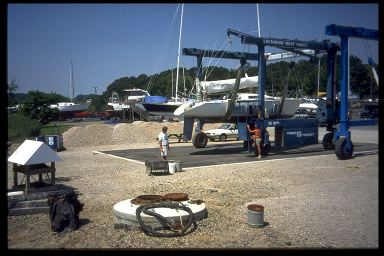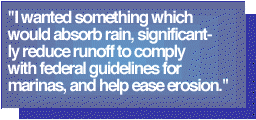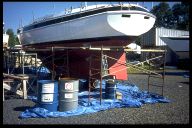
16. Lockwood Boat Works, Inc.
Recycled Crushed Concrete Controls Runoff, Saves Money Environmental change
| Location: | 1825 Highway 35, Morgan, South Amboy, New Jersey 08879-2525 |
| Telephone: | (908) 721-1605; fax: (908) 721-2740 |
| Interviewed: | William J. (Bill) Lockwood, General Manager |
| Owned by: | William V. and Mary Lockwood |
| Waterbody: | Raritan Bay |
Environmental change
Parking areas and the boat maintenance yard were covered with 6 inches of crushed concrete to control runoff at this New Jersey boat works.
The full-service marina and boatyard
Lockwood Boat Works, Inc., celebrating its 50th anniversary in 1996, is a first-class, full-service marina and boatyard owned and operated by the Lockwood family. It has 200 slips in 2 adjacent marinas-150 slips in the main facility and another 50 slips at the small Old Spye Marina just east and about 1,000 yards down channel, bought in 1995.
At the main yard, land storage is available for the winter season and boat repairs. Launching and hauling are done with a combination of two 35-ton open travel lifts. Full repairs, available in heated shops, include fiberglass, wood, hulls, engines, sail rigging, painting, and welding. A fuel dock and pumpout are available.
Up the hill, on Highway 35, Lockwood has a first-class retail ship's store with a full line of accessories, boat equipment, hardware, and used brokerage. Their sales motto is "If we don't have it, we'll find it for you."
Considered a home port by its boaters, there were a few liveaboards during the 1995 summer season with two remaining over winter. On a busy summer weekend, about 50% of the boats are used daily and about 20% overnight.
At Lockwood the boats range in size from 16 to 45 feet LOA, with the average between 28 and 35 feet LOA. In 1995, the slips were 100% occupied during the boating season, which runs from May 1 through the end of October. Sailboats make up 75% of Lockwood's boat population; 25% are powerboats.
The marina was begun in 1946, following World War II, by William V. Lockwood.
He started by building some docks, from which he rented and sold wood skiffs he built.
Gradually, the business grew into a full-service marina, now run by his 10 children.
Today, three generations of Lockwoods are working in the marina, boatyard, and retail
businesses. William J. (Bill) is the general manager.
|
Lockwood boat Works power-wash pad, work yard, and parking areas covered with recycled crush concrete. |
 |
Within 2 miles, there are three other marinas, ranging in size from 50 to 300 slips, with a combined population of almost 800 boats. Lockwood Boat Works' slip rates are similar to those of the neighboring facilities.
Management measures
Lockwood Boat Works complies with the marina management measure for storm water runoff control, as well as the measures for shoreline stabilization, fueling station design, sewage facility, maintenance of sewage facilities, solid waste, fish waste, liquid materials, petroleum control, boat cleaning, and public education.
Costs/benefits
Lockwood Boat Works installed 10 acres of crushed concrete in 1995 for a permeable, runoff-controlling yard surface at a cost of $18,000 per acre installed. By using a recycled product instead of blacktop paving, the marina saved $36,000 (a 67% saving) per acre. Assuming that the cost will be amortized over 20 years, Lockwood saved $14,444 in 1995 alone.
Environmental improvements
Instead of paving its parking areas and boat work yard, Lockwood Boat Works covered the entire 10 acres with a 6-inch layer of crushed concrete, a recycled product available from a local sand and gravel company.
This type of surface was selected over paved blacktop for two types of reasons: ecological and economic. Lockwood said, "I wanted something which would absorb rain, significantly reduce runoff to comply with federal guidelines for marinas, and help control erosion. Also, paving would have cost $54,000 per acre installed, or three times more than the $18,000 per acre cost to install the crushed concrete."
"Crushed rock was also considered, but it had two disadvantages over the concrete: cost and slow stability. The cost of crushed rock would have been $27,000 or one-third higher. The concrete stone was stable enough to drive trucks on it immediately after being spread, whereas 6 inches of crushed stone would have taken many weeks to settle before it would hold a truck's weight. And another benefit from using crushed concrete was that we used a recycled product, and that reduced the volume of waste concrete going to the landfill."
"At the same time, we built retaining walls on the hillside to reduce erosion and the need for maintenance dredging. We want to clean everything up so we will be able to stay in business with a clean operation."
Other improvements and benefits
Lockwood Boat Works runs a very clean and unusually neat boatyard. A major part of keeping clean is educating customers and employees. Before any boat is worked on outdoors, a plastic tarp is placed on the ground under the hull to catch any falling debris and dirt. Every day during boat repairs each tarp is swept or vacuumed clean. "We have been using drop cloths beneath our outdoor boat work for 4 years, and it works well," said Bill Lockwood. "Next year we are going to try 18-foot-wide filter fabric instead of tarps under every boat placed in winter storage."
One unique and effective approach used by Lockwood is its practice of placing two 55-gallon drums beside boats being worked on by staff or boat owners. Both barrels were painted with attractive vinyl signs by Screen Graphics of Florida. The gray barrel has two red-lettered vinyl signs: "Garbage Only" and "NO Recyclable Items." The other is painted blue with one large vinyl sign:
|
Commingled Recyclables ONLY
|
To further protect the environment, Lockwood uses a variety of clean marina practices.
- Staff and customers are required by contract to use only dustless sanders. "We have Fein vacuum sanders and a range of sandpaper discs available. The sanders rent for $15.00 per hour, plus disc cost. But if they buy their bottom paint from us, we give them the first 4 hours' use free."
- Used fuel filters, paint thinners, acetone, and other chemicals are picked by commercial services, which recycle or dispose of each and provide the marina with a statement of disposal.
- Aboveground, lined diesel and gasoline fuel tanks have replaced old, in-ground tanks.
- Scrap metal from boat and mast repairs is collected in a 30-yard bin, then hauled to a local scrap metal dealer and sold.
- Old wood beams, cradles, and blocking are cut up and placed for customers to take home for firewood. "It goes real fast," said Lockwood.
- Hulls are washed down on a paved asphalt pad, set about 25 feet inland from the travel lift well. This is the only place boats are high-pressure-washed. Wash water all runs into a centered drain that empties into a precast cement, in-ground settling tank. When the tank becomes nearly full, it is pumped out into a 55-gallon drum that contains a filter cloth bag. The filtered water runs out of holes in the barrel and into the ground. While showing a dry handful of the paint chips and debris collected in the bag, Bill Lockwood exclaimed, "Just think-in the past all this dirt ran into the marina waters!"
- Every marina customer gets a two-page environmental practices and rules statement. It describes the need for drop cloths under all yard work and provides practices for disposal of paint cans and toxic waste, bilge pumpout, fish cleaning, spring launching, and holding tank pumpout. "Our goal is to provide a safe and clean environment for your power and sail boating pleasure, and at the same time protect the environment around us."
|
|
Tarps placed beneath a boat being worked on to catch dirt and debris. Two 55-gallon drums are provided for rubbish and recyclables. |
Equipment sources
- Vinyl signs: Screen Graphics of Florida, Inc., 2801 Northwest 55 Court, Fort Lauderdale, FL 33309.
- Dustless sander: Fein-Vac; Fein Power Tools, Inc., 3019 West Carson Street, Pittsburgh, PA 15204.
http://www.epa.gov/owow/NPS/marinas/ch16.html
This page last updated October 4, 1999



